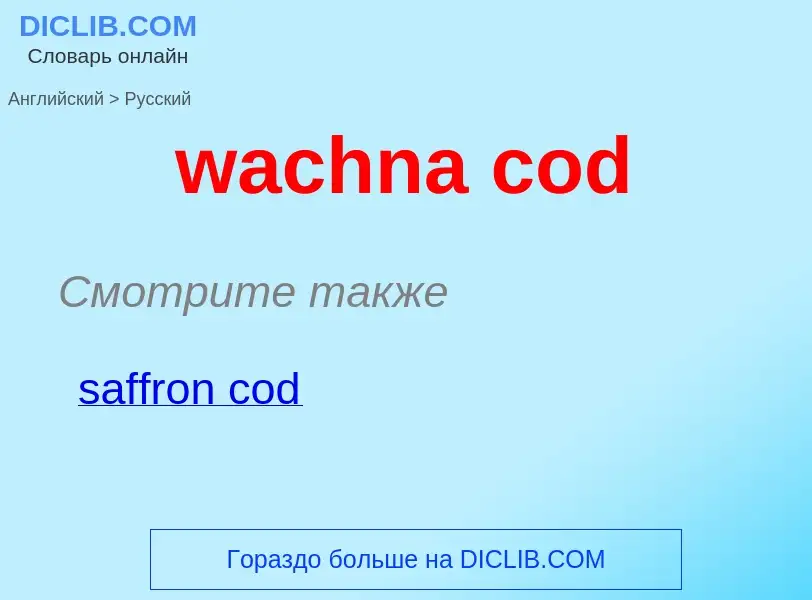Μετάφραση και ανάλυση λέξεων από την τεχνητή νοημοσύνη ChatGPT
Σε αυτήν τη σελίδα μπορείτε να λάβετε μια λεπτομερή ανάλυση μιας λέξης ή μιας φράσης, η οποία δημιουργήθηκε χρησιμοποιώντας το ChatGPT, την καλύτερη τεχνολογία τεχνητής νοημοσύνης μέχρι σήμερα:
- πώς χρησιμοποιείται η λέξη
- συχνότητα χρήσης
- χρησιμοποιείται πιο συχνά στον προφορικό ή γραπτό λόγο
- επιλογές μετάφρασης λέξεων
- παραδείγματα χρήσης (πολλές φράσεις με μετάφραση)
- ετυμολογία
wachna cod - translation to Αγγλικά
Смотрите также
['kɔdwɔ:]
общая лексика
"тресковая война", "война за треску" (конфликт между Великобританией и Исландией в связи с запретом на лов рыбы в прилегающих к Исландии водах в середине 70-х гг.; сопровождался столкновениями между британскими и исландскими судами; привёл к разрыву дипломатических отношений между этими странами)
['keip'kad]
география
п-ов Кейп-Код
синоним
Βικιπαίδεια
Cod is the common name for the demersal fish genus Gadus, belonging to the family Gadidae. Cod is also used as part of the common name for a number of other fish species, and one species that belongs to genus Gadus is commonly not called cod (Alaska pollock, Gadus chalcogrammus).
The two most common species of cod are the Atlantic cod (Gadus morhua), which lives in the colder waters and deeper sea regions throughout the North Atlantic, and the Pacific cod (Gadus macrocephalus), found in both eastern and western regions of the northern Pacific. Gadus morhua was named by Linnaeus in 1758. (However, G. morhua callarias, a low-salinity, nonmigratory race restricted to parts of the Baltic, was originally described as Gadus callarias by Linnaeus.)
Cod as food is popular in several countries. It has a mild flavour and a dense, flaky, white flesh. Cod livers are processed to make cod liver oil, a common source of vitamin A, vitamin D, vitamin E, and omega-3 fatty acids (EPA and DHA). Young Atlantic cod or haddock prepared in strips for cooking is called scrod. In the United Kingdom, Atlantic cod is one of the most common ingredients in fish and chips, along with haddock and plaice.

![The [[Atlantic cod]], ''Gadus morhua'' The [[Atlantic cod]], ''Gadus morhua''](https://commons.wikimedia.org/wiki/Special:FilePath/Atlantic cod.jpg?width=200)
![A fish with its gills infested with two [[cod worm]]s A fish with its gills infested with two [[cod worm]]s](https://commons.wikimedia.org/wiki/Special:FilePath/Lernaeocera branchialis.jpg?width=200)




![MAFF]] ships ''Lloydsman'' and ''Star Aquarius'', as seen from an Icelandic maritime surveillance aircraft MAFF]] ships ''Lloydsman'' and ''Star Aquarius'', as seen from an Icelandic maritime surveillance aircraft](https://commons.wikimedia.org/wiki/Special:FilePath/Vs Þór enganging Star Aquarius and Lloydsman on 11 December 1975.jpg?width=200)


![Cape Cod Auto Map, 1930s–40s postcard by [[Tichnor Bros.]] of Boston Cape Cod Auto Map, 1930s–40s postcard by [[Tichnor Bros.]] of Boston](https://commons.wikimedia.org/wiki/Special:FilePath/Cape Cod Auto Map (62797).jpg?width=200)

![The [[Bourne Bridge]] over the Cape Cod Canal, with the [[Cape Cod Canal Railroad Bridge]] in the background The [[Bourne Bridge]] over the Cape Cod Canal, with the [[Cape Cod Canal Railroad Bridge]] in the background](https://commons.wikimedia.org/wiki/Special:FilePath/Cape Cod Bourne Bridge and Railroad Bridge.jpg?width=200)


![[[Cranberry]] picking in 1906 [[Cranberry]] picking in 1906](https://commons.wikimedia.org/wiki/Special:FilePath/Cranberry Picking on Cape Cod.jpg?width=200)
![deposition]] of transported sediment (shown in blue). deposition]] of transported sediment (shown in blue).](https://commons.wikimedia.org/wiki/Special:FilePath/Deposition erosion.jpg?width=200)


![Nauset Light, erected here in 1923 and moved to a safer location in 1996, is on the [[National Register of Historic Places]]. Nauset Light, erected here in 1923 and moved to a safer location in 1996, is on the [[National Register of Historic Places]].](https://commons.wikimedia.org/wiki/Special:FilePath/Nauset Light, Eastham, MA, Cape Cod.jpg?width=200)
![Harwich]] Harwich]]](https://commons.wikimedia.org/wiki/Special:FilePath/Old Colony Rail Trail.jpg?width=200)
![Hyannis Harbor]] on [[Nantucket Sound]] Hyannis Harbor]] on [[Nantucket Sound]]](https://commons.wikimedia.org/wiki/Special:FilePath/Sum04-115.jpg?width=200)
![[[Veteran's Field]] in [[Chatham, Massachusetts]], home of the [[Chatham Anglers]] [[Veteran's Field]] in [[Chatham, Massachusetts]], home of the [[Chatham Anglers]]](https://commons.wikimedia.org/wiki/Special:FilePath/Veterans Field, Chatham MA (345015947).jpg?width=200)
